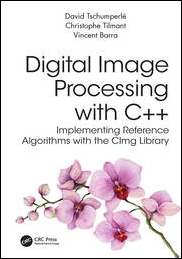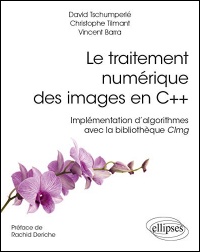The Library is a small and open-source C++ library for image processing, designed with these properties in mind :
 |
defines classes and methods to manage images in your own C++ code. You can use to load/save various file formats, access pixel values, display/transform/filter images, draw primitives (text, faces, curves, 3d objects, ...), compute statistics, manage user interactions on images, and so on... |
 |
defines a single image class able to represent datasets having up to 4-dimensions (from 1d scalar signals to 3d hyperspectral volumetric images), with template pixel types (bool,char,int,float,...). It also handles image collections and sequences. |
 |
is self-contained, thread-safe and highly portable. It fully works on different operating systems (Unix,Windows,MacOS X,*BSD,...) and is compatible with various C++ compilers (Visual C++,g++,clang++,icc,...). |
 |
is lightweight. It is made of a single header file CImg.h that must be included in your C++ source. It defines only four different classes, encapsulated in the namespace cimg_library. It can be compiled using a minimal set of standard C++ and system libraries only. No need for exotic or complex dependencies. |
 |
Although not mandatory, can use functionalities of external tools/libraries such as Board, FFMPEG, FFTW3. GraphicsMagick, ImageMagick, Lapack, libcurl, libjpeg, libpng, libtiff, Magick++, OpenEXR OpenCV OpenMP or XMedCon. Moreover, a simple plug-in mechanism allows any user to directly enhance the library capabilities according to his needs. |
 |
is a free, open-source library distributed under the CeCILL-C (close to the GNU LGPL) or CeCILL (compatible with the GNU GPL) licenses. It can be used in commercial applications. |
stands for Cool Image : It is easy to use, efficient and is intended to be a very pleasant toolbox to design image processing algorithms in C++. Due to its generic conception, it can cover a wide range of image processing applications.

